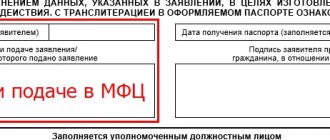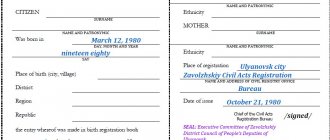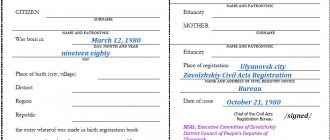Is it possible to change a child's last name?
The law allows changes to the personal data of children and adults. This applies to first name, last name and patronymic. True, the procedure is complicated and there is no guarantee that the application of the interested party will be satisfied.
The procedure for changing the full name of children is regulated by the Family Code of the Russian Federation (Article 59).
Consequences of changing a surname
Changing personal data is usually associated not with whim, but with necessity. For example, when, upon adoption, new parents want to give their child their family name and patronymic. In this case, the applicant needs to be prepared for the following nuances:
- All of the child's legal documents will have to be changed. This applies to a foreign passport, property rights to real estate or transport, and deposits held by children in financial institutions.
- The need to submit a copy of the certificate of change of surname to all authorities attended by children: school, clubs, sports clubs.
- The impossibility of subsequently taking the surname back (for example, when a court decision on adoption is annulled).
- Difficulties in proving family ties in inheritance. To receive material benefits after the death of close relatives (by law, but not within the framework of a will), it is not easy to confirm the legality of claims to material assets.
Does middle name change upon adoption?
Art. 134 of the RF IC establishes the procedure for changing the patronymic name of an adopted minor. If the adoptive parent has not made such a demand, then the middle name formed on behalf of the blood father is retained. If the mother of the minor was not married or paternity was not established, then the child retains the patronymic given to him by the mother.
Rules for changing patronymics:
- If a married couple acts as adoptive parents, at their request, the patronymic name can be formed on behalf of the adoptive parent.
- If a single woman acts as an adoptive parent, she can keep the minor’s middle name or change it to any other.
- If an intra-family adoption is carried out, the natural parent must give the adoptive parent consent to change the son/daughter’s data.
Example . Roman filed an application to the court to adopt his stepson. His wife agreed to change her son's surname and patronymic. The boy did not know that the adoptive father was not his blood father, so it was impossible to question the minor in court. The court took into account the circumstances and satisfied the applicant's demands.
Is the father's consent required to change the child's surname?
Yes, to change a child's personal data, the consent of both parents is required. The following may initiate a change of personal data:
- adoptive parents;
- children over 14 years old;
- both parents, regardless of the fact of divorce.
Since the mother and father are endowed with the same rights and responsibilities in matters of growing up a common child, it will be possible to make adjustments to his personal information only by mutual consent.
In what cases is the father's consent not required?
Art. 59 of the Family Code establishes a list of circumstances in which the opinion of the second parent is not necessary:
- inability to establish place of residence;
- recognition of an adult as completely incompetent;
- proving that he is evading the duties entrusted by law;
- deprivation of parental rights;
- revocation of paternity or lack of legal confirmation of relationship (no entry on the birth certificate).
The procedure for changing a child's surname without the consent of the father
The list of grounds that allow you to change the child’s full name without the consent of the second parent is described in Article 59 of the RF IC. If at least one circumstance is present, the mother must take the following steps:
- Filing a claim in a district court of general jurisdiction, where the defendant will be the father who refuses to change the surname/name of the children. The claim is not filed only if the parent’s rights are deprived or he is declared missing.
- Consideration of the dispute and argumentation of the need to correct the birth certificate in order to protect the interests of minors.
- Obtaining a court decision allowing/refusing a possible change of personal information.
- Preparation of an application to the guardianship authorities. The appeal is submitted at the place of registration of the child and must contain the reason for the change of surname.
- Preparation of the necessary documents, including a woman’s passport, a child’s birth certificate, a divorce certificate, a document confirming the right to unilaterally change the full name.
- Submitting an application and waiting a month for its consideration.
- Applying to the registry office with subsequent payment of the state fee.
- Obtaining a new birth certificate.
For children under 14 years of age, written consent from the father is not required. It is enough to express your opinion orally. The woman must argue for the need to change her surname and the benefits for the child.
Is it possible and how to get a divorce if the child is under 1 year old?
State duty for changing surname
Cases when the consent of the second parent is not necessary
As already said, according to Art. 59 of the Family Code of the Russian Federation, the main basis for changing a child’s name is a joint request of the parents sent to the guardianship authority. However, the legislator has also provided for a number of exceptions that answer the question of how to change the surname of a child under 14 years of age without taking into account the opinion of the second parent.
To do this, one of the exceptional circumstances must exist, namely:
- inability to locate the other parent;
- ignoring alimony obligations;
- avoidance of parental responsibilities;
- birth out of wedlock;
- deprivation of parental rights;
- determination by the court of incapacity.
For a complete understanding, it is advisable to consider each of these grounds in more detail.
Unable to locate father
According to Part 2 of Art. 59 of the Family Code, the father’s consent to change the child’s surname is not mandatory in cases where it is not possible to establish his whereabouts. This, in particular, applies to cases where the parent does not live at his place of registration, in another locality or even state, without maintaining ties with the child and former family, is wanted for committing crimes or is listed as missing.
It is necessary to separate the reluctance and impossibility of determining the location: if the ex-spouse does not live at his place of registration, it is likely that his relatives live there and may have contact with him.
Please note that guardianship authorities are scrupulous in this matter, and therefore often require convincing evidence of the impossibility of determining the whereabouts of the child’s father. In such cases, the investigator's order to search or a judicial act declaring the father missing will be the most convincing evidence.
Non-payment of alimony
The responsibilities of each of the child’s parents, regardless of whether he lives with him or not, include the financial support of his offspring. For those parents who do not live with their children, it is in the form of alimony. Avoidance of this obligation without good reason, in accordance with Part 2 of Art. 59 of the Family Code is also a basis for ignoring the opinion of such a parent if they want to change the child’s surname.
To make it easier to prove the fact of evasion, alimony must be assigned in court or by documented agreement, and the collection itself must go through bailiffs. If there is arrears of alimony, the bailiffs will easily issue the appropriate certificate, which will become convincing evidence for the guardianship authorities.
But before changing the surname of a minor child to the surname of the mother, it should be taken into account that the specific period and amount of alimony debt, which makes it possible not to take into account the opinion of the defaulting father, is not determined by law. In the context of this, it is logical to use the period of non-payment qualified by Art. 5.35.1 of the Code of Administrative Offenses as evasion of alimony payment, and amounting to 2 or more months from the date of opening of enforcement proceedings.
Avoidance of raising a child
Similarly, the law allows the father’s opinion not to be taken into account when changing the child’s name if the father does not participate in his upbringing without good reason. And although this basis is one of the reasons for deprivation of parental status, it is quite difficult to prove the fact of such evasion.
Such evasion should be considered as a parent’s evasion from fulfilling his parental responsibilities specified in Art. 63-65 SK, although even there they are quite blurred. Avoidance of child support obligations can also be considered in the context of this ground, since child support is one of the main responsibilities of parents.
Bastard
Another case when a mother can change her child’s surname to her own, regardless of the opinion of the biological father, is determined by Part 3 of Art. 59 of the Family Code. According to it, the child must be born out of wedlock and the paternity of the biological father has not been established. In this case, the mother will only need to contact the guardianship authority, which will be able to issue permission to change personal data corresponding to her current surname. But even in this case, the guardianship authority is obliged to proceed from the interests of the child.
Father deprived of parental rights
According to Part 2 of Art. 59 of the Family Code, deprivation of parental rights is also included in the list of grounds that allow one to ignore the opinion of the biological father regarding changing the child’s name. Therefore, the answer to the question whether it is possible to change the surname and patronymic of a child if the father is deprived of parental rights will be positive.
According to Art. 70 of the Family Code, parental status is abolished in court, therefore, along with an application to change the child’s name, a corresponding court decision is submitted to the guardianship authorities.
Father's incapacity
Recognition of the incapacity of one of the parents is also recognized by the legislator as a valid reason for changing the child’s personal data without his consent and taking into account his opinion. Recognition of incapacity, according to Art. 29 of the Civil Code, carried out in court on the basis of mental disorders of the citizen. Please note that partial limitation of legal capacity caused by alcohol or drug addiction does not give the right to ignore the father’s opinion regarding changing the child’s name: in this case, it is necessary to obtain his consent.
The procedure for changing the surname of a child under 14 years of age with parental consent
With the mutual consent of the mother and father, the procedure will be much easier. Required procedure:
- the emergence of grounds for changing the surname/patronymic;
- preparation of documents;
- submitting a written application to the guardianship authorities;
- expectation of results and positive decisions;
- transfer of documents to the registry office;
- obtaining a new birth certificate.
Where to contact?
First, you will have to contact the territorial department of the guardianship authorities, located at the address of registration and permanent residence of the minor. After receiving a positive response, an application is prepared to the territorial registry office.
Sample application for permission to change a surname
A parent who wishes to change the last name/first name of a minor must personally draw up an application to the guardianship authorities to change personal data.
Mother and father write different messages.
In his application, the interested party must provide the following information:
- Full name and residential address of the applicant;
- title of the letter;
- personal information of the child;
- desired surname;
- the reason for the data change;
- signature, date of submission of the application.
To the head of the PLO of the city of Stepanovo
From: Larisa Antonovna Sergeeva,
Residents: Stepanovo,
st. Krasnogvardeyskaya 18/458
Application for permission to change the surname of a minor
I ask for your permission to change the surname of my minor daughter Sofya Alekseevna Lysenko, born in 2021. with the surname Sergeev.
Lysenko's father S.A. - Lysenko Alexey Georgievich lives separately from the family due to the official dissolution of the marriage. Lysenko A.G. did not provide consent to change his surname, but, guided by Art. 59 of the RF IC, I ask you to make a decision without his participation due to evasion of obligations to raise his daughter. The evasion is confirmed by a certificate from the FSSP about alimony arrears.
02.02.2019 Sergeeva L. A.
Sample permission to change surname
The law does not establish a uniform form of permission from the guardianship authorities to change the personal information of a child. As a general rule, the document must contain:
- name of the authority issuing the permit;
- personal information of the applicant;
- reason for change;
- permission to choose a specific first/surname.
Chertanova Klavdia Semenovna,
born December 18, 1986, resident:
Lubyansk, st. Steelworkers 17
Permission to change surname
Based on your application dated November 14, 2021, to change the surname of your daughter, Inna Stepanovna Markova, due to divorce from her husband and transfer of the child to the care of the mother, who was appointed as the girl’s legal representative, a decision has been made.
Taking into account the mutual consent of the parents to change Markov’s surname to Chertanov’s surname, the Lubyansky Department of Guardianship and Trusteeship Authorities allows changing the child’s personal data.
12/12/2018 Director of the Lubyanka Department of the PLO Samoilov K.V.
Samoilov K.V.
List of documents
The list of documents at all stages should include:
- child's birth certificate;
- statement from the concerned parent;
- consent of the second parent.
Additionally you may need:
- handwritten consent of a minor who has reached 10 years of age;
- marriage/divorce certificate;
- confirmation of paternity;
- certificate of family composition;
- FSSP certificate about alimony arrears;
- court decision on deprivation of parental rights.
The list is incomplete and may be supplemented depending on the circumstances of the case.
Amount of state duty and processing time
In 2021, according to the articles of the Tax Code of Russia, the state duty for changing personal information is 1,600 rubles. For additional production of a new birth certificate you will have to pay 650 rubles.
In accordance with the provisions of the Federal Law “On Civil Registration Bodies”, the period for consideration of an application is 30 days after receipt of a written application. This period can be extended for another 2 months if necessary.
Rules for determining a surname
Rules for changing full name the adopted child is contained in Art. 134 RF IC .
| No. | Rules |
| 1 | If the adoptive parents do not request a change of surname, then the data of the blood parents is saved |
| 2 | If the adoptive parents have different surnames, then they independently choose which one will be assigned to the baby |
| 3 | If an intra-family adoption occurs, then with the consent of the blood parent, the court may change the surname of the adoptive parent |
Example . Upon marriage, Irina decided to leave her last name. After marriage, the couple decided to adopt the baby. When submitting the application, a dispute arose about what data to assign to the adoptee. The couple decided to leave this decision to the discretion of the court. Since the lawsuit did not contain a specific surname that should be assigned to the child, the court retained the data of his blood parents.
If the device is issued in relation to a minor over the age of 10 years , then his consent will be a prerequisite. Otherwise, the court will violate the child’s right to personal data.
As an exception, there is a situation where a minor lives for several years in the family of adoptive parents and considers them his parents. In this case, the judge does not involve the child in the process.
In case of cancellation of adoption, citizens have the right to demand that the minor's surname be changed back.
The role of age in changing personal data
The legislation establishes significant restrictions on changing the personal information of children:
- the patronymic cannot be changed at the unilateral request of the legal representative (the only basis is adoption or recognition of paternity in court by another man);
- You can only change your surname to the surname of your father/mother;
- The guardian has the right to change the child's name at his own discretion.
Table No. 1 “The influence of age on the procedure”
| Age of children, in years | Peculiarities |
| 0-10 | Only parents or adoptive parents can initiate changes. A guardian cannot apply to change children's personal data. Additionally, you must obtain written permission for the procedure from the guardianship authorities at the place of registration/permanent residence of the family. The permit, along with other mandatory documents, is submitted to the territorial civil registry office for entering information into the civil registration book and issuing a new birth certificate |
| 10-14 | There is no need to involve guardianship authorities, but after reaching the age of 10, children can and should express their opinion regarding participation in various legal transactions. Including when changing your last name or first name. Children, together with their parents, must be present at the registry office, where consent to change the information must be written. If the child does not want to change his first or last name, the interested parent can initiate legal proceedings |
| 14-18 | Persons over 14 years of age can independently participate in legal events, but only with the written consent of their parents. If a minor wishes to change his last name, then it is enough to obtain the written consent of the mother/father (adoptive parents) and send the application to the registry office. Participation of the board of trustees is not required |
| Over 18 | Independent participation in all procedures without the consent of parents or additional authorities |
The procedure for changing a child’s surname after 14 years of age
Children over 14 years of age have the right to independently initiate a change in their family name. To do this, perform the following steps:
- preparation of a handwritten application;
- obtaining written consent from the mother and father (after 14 years of age, a positive decision from the father is mandatory);
- preparation of additional documents (birth certificate, parents’ passports);
- contacting the registry office to register the change.
Guardianship and trusteeship authorities do not participate in the procedure.
Features of changing a child’s surname after 16 years of age
At the age of 14-18 years, the algorithm of actions will be the same. The exception is premature acquisition of full legal capacity. This happens for the following reasons:
- marriage;
- full-time employment (financial independence);
- registration of individual entrepreneurs and start of business activities.
If these circumstances exist, a sixteen-year-old citizen can independently, having collected all the documents, apply directly to the registry office. There is no need to obtain oral or written parental consent.
How to change a child's last and patronymic names?
The law in this part establishes even more stringent requirements, but many mothers continue to worry about the question of how to change the middle name of a child under 14 years of age or older? Problems will not arise if the child has a “new father” who decides to adopt him and (or) only if any of the following conditions are present:
- The child's biological father is deprived of parental rights;
- The father is not listed on the birth certificate;
- Information about the father is entered from the words of the mother and, most often, is fictitious;
- The child's father challenged his paternity and the court made an appropriate decision both on the basis of a DNA examination and on the basis of the recognition of the claim by the child's mother.
In all other cases, a change of patronymic for children under 18 years of age is impossible or possible in court in the presence of exceptional circumstances.
Children can independently apply for a change of surname in cases of emancipation - early, before reaching the age of 18, obtaining full legal capacity due to marriage, for example. In this case, the consent of the guardianship authorities or parents is not required.
If any difficulties or problems arise, legal specialists are ready to provide a full range of advisory and other legal assistance, including comprehensive assistance. We will help you successfully resolve any complex legal situations related to divorce. Call + or write to WhatsApp.
Lawyer's answers to frequently asked questions
Can guardianship authorities refuse to change your last name?
Yes, guardianship and trusteeship authorities have the right to refuse to issue permission under the following circumstances:
- disagreement of one of the parents;
- violation of the interests of children when changing personal data.
In case of illegal refusal, the applicant may file a claim with the court or a complaint with the prosecutor's office.
Is it possible to change a surname without adopting a child?
Changes to personal data can only be initiated by:
- biological parents, information about whom is on the birth certificate;
- adoptive parents in respect of whom the court decision has entered into force.
In other cases, you will not be able to submit an application.
Is it possible, if I have my father’s permission to change my last name, to immediately apply to the registry office, bypassing the guardianship authorities?
The participation of guardianship authorities is mandatory only for children under 14 years of age, so everything depends on the age of the child, and not on the wishes of the parent.
In what cases is it not necessary to obtain the father's consent?
In some cases, the mother can single-handedly change the child's surname without asking the father's consent. For example, if he:
- deprived of parental rights;
- declared incompetent;
- declared missing;
- evades payment of alimony;
- does not fulfill parental responsibilities, does not take part in raising the child.
The mother needs to justify the lack of consent of the father. To do this, she must provide the guardianship authority with the following documents (depending on the specific situation):
- court decision (on deprivation of parental rights, on recognition as incompetent or missing);
- address certificate;
- extract from the house register;
- certificate of arrears of alimony;
- witness's testimonies.
Having provided a complete list of documents, the child’s mother must write a statement. If the guardianship representative considers the circumstances serious enough, he will issue permission. Next, the child’s mother can contact the registry office.
Who has the right to represent the interests of parents and children?
His legal representatives act on behalf of a minor child:
- Parents.
- Adoptive parents.
- Guardians.
The document that confirms that they have the authority to perform such actions must additionally specify the degree of relationship between the applicant and the child.
From the age of fourteen, the child independently decides what his last name will be, but to change it he will have to obtain the consent of his parents.
Important! Only a representative with a power of attorney can act on behalf of the parent.
Cases when you can change your last name without taking into account the opinion of the other party
When the divorce process occurs, “I gave birth, I want the child to have a premarital surname” is a fairly common statement from mothers. After a divorce, not all mothers want their children to have something in common with their fathers. There are several circumstances under which the issue can be resolved unilaterally.
Among the main reasons are the following:
- The spouse has died, been officially declared incompetent or missing. It is enough to document all of the above facts so that you can unilaterally change your last name.
- It is impossible to establish the man's place of residence. The father is registered at one address, but does not live there, and the guardianship authorities cannot contact him. In this case, the process of changing the child’s surname after the parents’ divorce will go quickly and without complications.
- The ex-husband does not help financially. In such a situation, the guardianship authorities need to provide evidence that child support is not being paid.
- The father does not take part in the joint upbringing of his offspring. When such facts can be proven, solving the problem is easier. To do this, you can turn to relatives, neighbors or friends for help, who will confirm the lack of participation of your ex-spouse in the child’s life.
Where to contact?
For permission to change the child’s surname, the parent will have to contact one of the following authorities:
- to the guardianship and trusteeship authorities;
- to the court.
The guardianship authority should be contacted when the child is under 14 years of age and the parent living separately does not object to changing his surname. In some cases, the law may allow a request to change a name to be approved without obtaining the permission of the absent parent.
When contacting this body, you need to take into account that the reasons for changing your last name are of great importance for obtaining permission, which should be stated in the application in as much detail as possible. The emphasis in describing the situation should be on the interests of the child himself.
A large percentage of cases of this kind are considered in court. It is especially often necessary to go there if it is impossible to obtain consent from a parent who does not live with the family. Preferable for applying to this authority is the opportunity to convince the court of the fairness of the demand and to defend the claimed rights on the basis of the evidence presented about the need to change the child’s surname without the participation of the father.
Changing the child's surname to the surname of the mother's new husband
After separation, former spouses can create new families. If the child’s mother remarried and took the surname of her second husband, then, as a rule, she wants the whole family to have the same surname and strives to transfer the child to the stepfather’s surname. She also has the right to obtain permission from the guardianship authorities, if only her own father gives consent. At the same time, he will retain all rights and obligations in relation to the child, and he will continue to be listed as his father according to documents.
If the new husband decides to adopt a child, having received the consent of the natural father, then the child will change to the surname of the new husband on the basis of adoption. At the same time, he will have a new not only last name, but also a patronymic corresponding to the name of the new parent. The biological father will legally lose all rights and obligations regarding the child.










